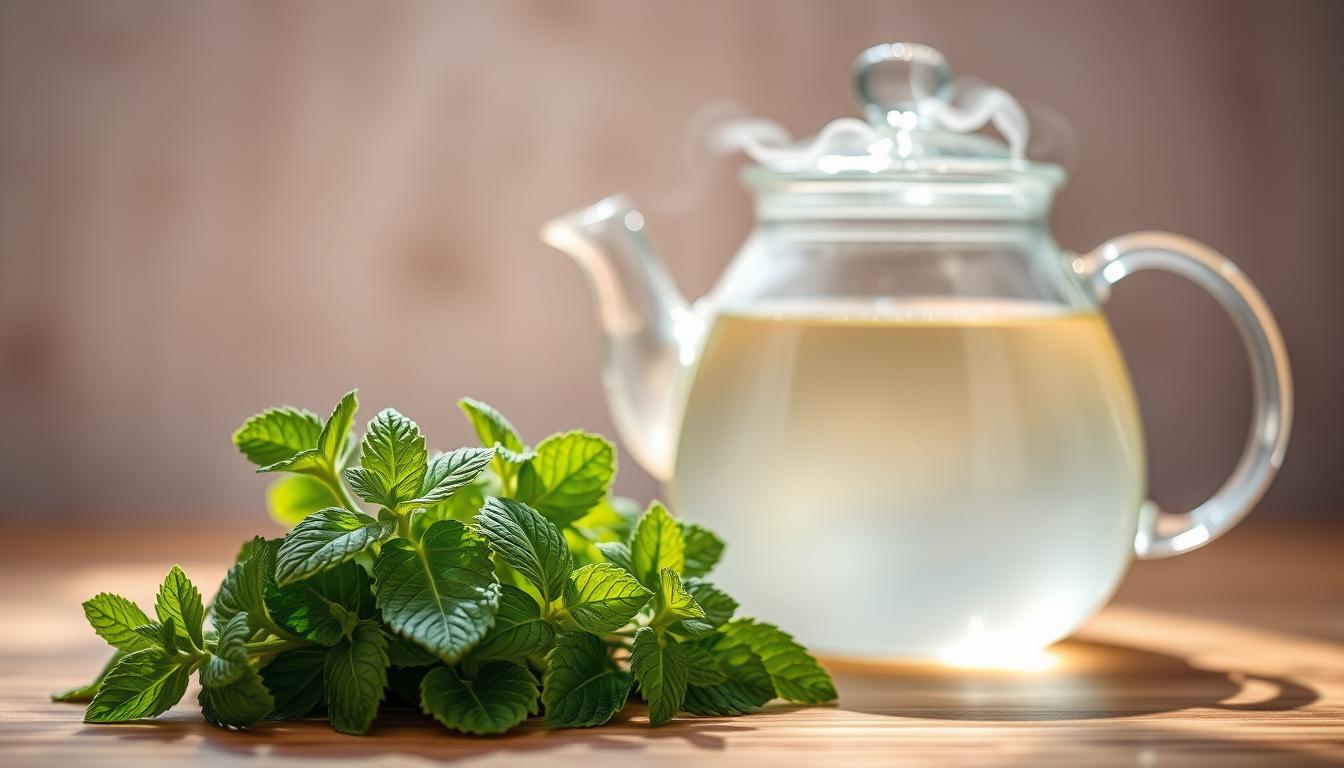Did you know that over 75% of pregnant women experience nausea during their first trimester? This common discomfort often leads to a search for natural remedies. Among the most popular options is herbal tea, known for its soothing properties and caffeine-free benefits.
Peppermint tea, derived from the aromatic peppermint plant, has gained attention for its potential to ease nausea and stomach discomfort. Its refreshing flavor and natural qualities make it a go-to choice for many. However, with limited research on caffeine alternatives during pregnancy, questions about its safety arise.
While this herbal remedy is generally considered safe in moderation, it’s essential to understand its benefits and precautions. This article dives into expert recommendations, dosing tips, and how peppermint tea can fit into a healthy pregnancy routine. Stay tuned for a detailed review of its natural remedy aspects and practical advice.
Key Takeaways
- Peppermint tea is a caffeine-free herbal option for pregnant women.
- It may help alleviate nausea and stomach discomfort.
- Moderation is key to avoid potential side effects.
- Limited research exists on caffeine alternatives during pregnancy.
- Expert recommendations and dosing tips are crucial for safe use.
Understanding Peppermint Tea and Its Uses
Peppermint tea’s origins trace back to Europe and Asia. This aromatic infusion has been cherished for centuries, not just as a beverage but also as a natural remedy. Its refreshing flavor and soothing properties have made it a staple in many cultures.

History and Origins
The peppermint plant, a hybrid of watermint and spearmint, has been cultivated since ancient times. Historical records show its use in traditional herbal medicine across Europe and Asia. People valued it for its ability to ease digestive discomfort and refresh the senses.
In medieval times, peppermint was often grown in monastery gardens. Monks used it to create infusions that were believed to promote health. Today, its legacy continues as a popular herbal drink.
How Peppermint Tea is Made
Creating this herbal infusion is simple. Fresh or dried leaves are steeped in hot water, releasing their natural oils and flavors. The process ensures a caffeine-free drink that’s both refreshing and calming.
Commercially produced versions often use finely ground leaves, while homemade brews allow for customization. The amount of leaves used can vary, influencing the strength and aroma of the final product.
Whether store-bought or homemade, peppermint tea remains a trusted form of herbal medicine. Its natural composition makes it a preferred choice for those seeking a safe and soothing beverage.
is peppermint tea safe for pregnancy
Many expectant mothers wonder about the safety of herbal drinks during their pregnancy journey. While this aromatic infusion is generally considered safe, experts recommend moderation and awareness of trimester-specific risks.
Current Expert Recommendations
Health professionals agree that consuming this herbal drink in moderation poses little risk. Studies suggest it can be a soothing, caffeine-free option for those experiencing nausea or stomach discomfort. However, overconsumption should be avoided.
Experts emphasize the importance of consulting a healthcare provider before adding any herbal remedy to your routine. This ensures personalized advice tailored to your unique needs.

First Trimester Considerations
The first trimester is a critical period in fetal development. Some herbalists caution against excessive use of this drink during this time due to its potential emmenagogue effects. These effects could, in rare cases, trigger early menstruation.
However, there is no documented evidence linking moderate consumption to miscarriage. Comparing it to other herbal options, such as raspberry leaf tea, highlights its relative safety when used responsibly.
“Moderation is key when incorporating herbal remedies into a pregnancy routine. Always prioritize professional guidance.”
To summarize, this herbal infusion can be a comforting choice when consumed wisely. Tailoring precautions to each stage of pregnancy ensures both safety and enjoyment.
Benefits and Potential Uses During Pregnancy
Herbal infusions have long been a trusted remedy for various health concerns. Among them, the infusion derived from the aromatic plant known for its menthol content stands out. This drink is celebrated for its ability to ease discomfort, making it a popular choice for pregnant women.
Relieving Nausea and Vomiting
One of the most common challenges during pregnancy is nausea. The active compounds in this plant, particularly menthol, have a calming effect on the digestive system. Studies suggest that sipping a cup of this infusion can reduce feelings of queasiness.
Historically, this remedy has been used to address stomach upset. Its natural properties make it a gentle option for those seeking relief without harsh chemicals. For pregnant women, this can be a comforting solution when consumed in moderation.
Soothing Stomach Discomfort
Beyond nausea, this infusion is known to ease general stomach discomfort. The menthol it contains helps relax the muscles of the digestive tract, promoting better digestion. This can be especially beneficial during pregnancy, when digestive issues are common.
Research supports its use as a natural remedy for gastrointestinal discomfort. A moderate intake of 1-2 cups per day is often recommended to avoid any adverse effect. This balance ensures the benefits are enjoyed without overuse.
In summary, this herbal drink offers a natural way to support health during pregnancy. Its soothing properties, derived from a well-known plant, make it a trusted choice. Always consult a healthcare provider to ensure it fits your individual needs.
Precautions, Dosage, and Potential Side Effects
Moderation plays a key role in enjoying the benefits of natural infusions. When it comes to herbal drinks, understanding proper use ensures both safety and effectiveness. This is especially important for expectant mothers who want to avoid unwanted side effects.
Recommended Amounts
Research suggests that 1 to 2 cups per day is a safe amount for most people. This moderate intake helps prevent stomach upset while still providing the soothing effects of the leaf. Overconsumption, however, can lead to increased nausea vomiting or other digestive issues.
It’s always a good idea to consult a healthcare provider for personalized advice. They can help determine the right dosage based on individual tolerance and health needs.
Recognizing Unwanted Side Effects
While generally safe, excessive use can cause mild side effects. These may include stomach discomfort, heartburn, or even increased feelings of vomit. Paying attention to your body’s reactions is crucial to avoid overdoing it.
Constituents from the leaf can have stronger effects at higher concentrations. If you notice any adverse reactions, reduce your intake or leave it out of your routine temporarily.
To ensure safety, choose reputable brands and follow recommended serving sizes. These precautions help you enjoy the benefits without risking adverse consequences. Remember, moderation is key to a healthy and balanced approach.
Comparing Peppermint Tea to Other Herbal Teas
Exploring herbal options during pregnancy can be both exciting and overwhelming. With so many choices available, understanding the unique benefits and precautions of each herb is essential. This section compares three popular options: ginger, chamomile, and raspberry leaf. Each offers distinct advantages and considerations for expectant mothers.
Ginger Tea
Ginger is well-known for its ability to ease nausea, a common issue during the first trimester. This herb contains active compounds that soothe the digestive system, making it a trusted remedy for morning sickness. Unlike some options, ginger is naturally caffeine-free, which is ideal for pregnant women.
Experts recommend consuming 1-2 cups daily to avoid overuse. While generally safe, excessive amounts may cause heartburn or irritation. Always consult a healthcare provider to ensure it fits your needs.
Chamomile Tea
Chamomile is celebrated for its calming properties, helping to reduce stress and promote better sleep. However, its use during the first trimester is controversial. Some studies suggest it may stimulate uterine contractions, posing risks in early pregnancy.
For those in later stages, moderate consumption is often considered safe. Its gentle flavor and relaxing effects make it a popular choice, but caution is advised. Always prioritize professional guidance when incorporating chamomile into your routine.
Raspberry Leaf Tea
Raspberry leaf is often associated with preparing the body for birth. This herb is believed to tone the uterine muscles, potentially aiding in labor. However, it’s typically recommended only in the third trimester to avoid premature contractions.
Unlike other options, raspberry leaf has a mild, earthy flavor. Its benefits are widely recognized, but timing is crucial. Always consult your healthcare provider before use.
| Herbal Tea | Benefits | Considerations |
|---|---|---|
| Ginger | Eases nausea, caffeine-free | Limit to 1-2 cups daily |
| Chamomile | Promotes relaxation, aids sleep | Avoid in first trimester |
| Raspberry Leaf | Prepares for birth, tones uterus | Use only in third trimester |
In summary, each herb offers unique benefits tailored to different stages of pregnancy. Ginger is ideal for nausea, chamomile for relaxation, and raspberry leaf for labor preparation. Understanding their distinct attributes helps you make informed choices for a healthy and comfortable journey.
Expert Research and Trends in Herbal Medicine
Recent advancements in herbal medicine shed light on maternal wellness. Multiple studies have explored the effects of natural infusions during pregnancy, emphasizing the importance of rigorous research. Trends show that remedies like peppermint and raspberry remain popular among pregnant women.
Recent Studies Overview
Current research highlights the benefits of herbal infusions for maternal health. Studies on peppermint reveal its potential to ease nausea and digestive discomfort. Similarly, raspberry has been linked to uterine health, though its use is often limited to later stages of pregnancy.
Emerging research also examines the role of food-derived components in herbal remedies. These studies aim to clarify how natural ingredients support maternal health without adverse effects. For example, some findings suggest that excessive use of certain herbs may increase the risk of preterm labor.
| Herbal Remedy | Key Findings | Considerations |
|---|---|---|
| Peppermint | Eases nausea, supports digestion | Moderation advised |
| Raspberry | Promotes uterine health | Use in third trimester only |
Experts recommend consulting healthcare providers before incorporating herbal remedies into a pregnancy routine. This ensures personalized advice tailored to individual needs. As research continues, future studies aim to refine guidelines and explore new applications of herbal medicine for pregnant women.
Conclusion
Natural remedies have always been a trusted companion for maternal wellness. This study highlights that consuming one to two cups daily of this herbal infusion can offer soothing benefits. Its active ingredient, menthol, provides natural relief for common discomforts.
Compared to alternatives like green tea, this herbal option stands out for its caffeine-free and gentle properties. Experts recommend moderation and monitoring for any adverse reactions. Always consult a healthcare provider before making changes to your routine throughout pregnancy.
This article provides balanced guidance, blending medicine and tradition. Embrace the benefits of this herbal remedy while prioritizing professional advice for a healthy journey.

